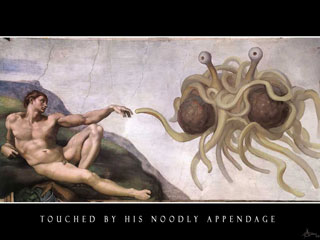New Atheists

Here's an interesting personal take on the article and the issues in general by a guy at Brown I've had a few cog sci classes with and whose blog I secretly read.

Another fan of Richard Dawkins was Douglas Adams, of The Hitchhiker's Guide to the Galaxy renown. He was a staunch atheist, having given serious thought to religion and any evidence present relating to the existence or nonexistence of god.
Adams actually gave a very interesting speech about religion and his views on it. He was very steadfast in his belief that there is no god, but he makes a case that religion is not pointless and useless. He makes a case for an "Artificial God," which guides humanity.
In addition to having some very clever and humorous lines in the speech, there was also a very interesting analogy to feng shui. Feng shui is supposed to guide the way a building or room should be put together, and apparently the way this is done is to imagine that the building or room is inhabited by dragons and to design the room with dragons in mind (I don't know much about feng shui, so I'm going to assume he's correct about all this). Anyways, I doubt many people believe in dragons, or that they should design rooms specifically so the dragons are happy there, but Adams points out that if you design a room such that a dragon would be happy, it tends to be a very nice room that people will also be happy to live in. So the parallel is that he believes that religion can be useful to make things work and make people lead peaceful, happy, productive lives. However, he does not believe that god actually exists, simply that the idea of god and living with faith in that idea can be useful.
I myself am an agnostic, having thought about this a great deal and having come up with my own personal definition of agnosticism. So while I am not an atheist, this was an interesting read. Anyone interested in the full text of the speech should find a copy of The Salmon of Doubt, which is a collection of work they found on Adams' computer after he died. I have been thoroughly enjoying the read, as it contains articles he wrote on technology, biology, and religion, as well as personal anecdotes, interviews, and some unpublished work. Personally, I love Douglas Adams' writing, and this collection does not disappoint.
As a recovering atheist having survived four years of an intensely religious social environment, I actually found Richard Dawkins' "The God Delusion" to be spuming nonsense (mostly). Exceptions included the way he interjected himself with a few bright moments - quotes by Albert Einstein, Ralph Waldo Emerson -- anyone but himself.
It was hard for me to believe that the same man who had penned such creativity in "The Selfish Gene" could resort to same defensive absolutisms of thought he so despises. As he toured around this fall to public radio stations and broadcast interviews, who did he actually think would read his book? I found a press copy of it in the "Please Take" bin of a coworker, and picked it up more for its incendiary title than its byline.
I doubt it has sold very many copies. Sure as hell has pissed lots of people off. And atheists like myself may have found themselves nodding along for the first few chapters, before nodding off to the conventional defenses that many non-believers make to their unpopular cause: "Religion causes war. Kantian ethics will prevail if there is no religion. We are hurting the children in Kansas." Thank you, Katie Couric.
There is no argument, no "rational" approach in book, only bitterness, venom, and a sense of superiority over the 90% of people in this world who happen to believe in a god, or gods, and either 1) don't think too much about it, or 2) do, and will die for what they believe in. Good one - I'm sold, Dawkins! Sign me up for your circus act!
Garbage. Rubbish. Send me your address if you'd like my copy. That said, I will quote a quote that Dawkins quotes - as is the case with the rest of the book, he is indirectly inspirational.
"Isn't it enough to see that a garden is beautiful, without having to believe that there are fairies at the bottom of it, too?" -Douglass Adams